TEM8(1995-2010)汉译英答案
- 格式:doc
- 大小:48.00 KB
- 文档页数:7
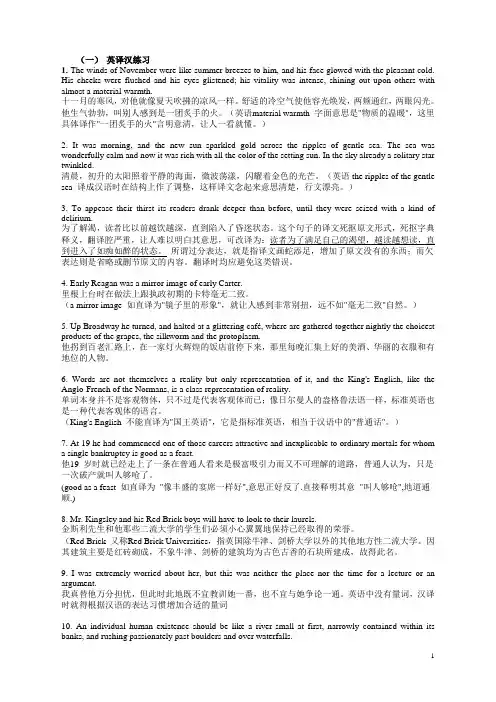
(一)英译汉练习1. The winds of November were like summer breezes to him, and his face glowed with the pleasant cold. His cheeks were flushed and his eyes glistened; his vitality was intense, shining out upon others with almost a material warmth.十一月的寒风,对他就像夏天吹拂的凉风一样。
舒适的冷空气使他容光焕发,两颊通红,两眼闪光。
他生气勃勃,叫别人感到是一团炙手的火。
(英语material warmth 字面意思是"物质的温暖",这里具体译作"一团炙手的火"言明意清,让人一看就懂。
)2. It was morning, and the new sun sparkled gold across the ripples of gentle sea. The sea was wonderfully calm and now it was rich with all the color of the setting sun. In the sky already a solitary star twinkled.清晨,初升的太阳照着平静的海面,微波荡漾,闪耀着金色的光芒。
(英语the ripples of the gentle sea 译成汉语时在结构上作了调整,这样译文念起来意思清楚,行文漂亮。
)3. To appease their thirst its readers drank deeper than before, until they were seized with a kind of delirium.为了解渴,读者比以前越饮越深,直到陷入了昏迷状态。
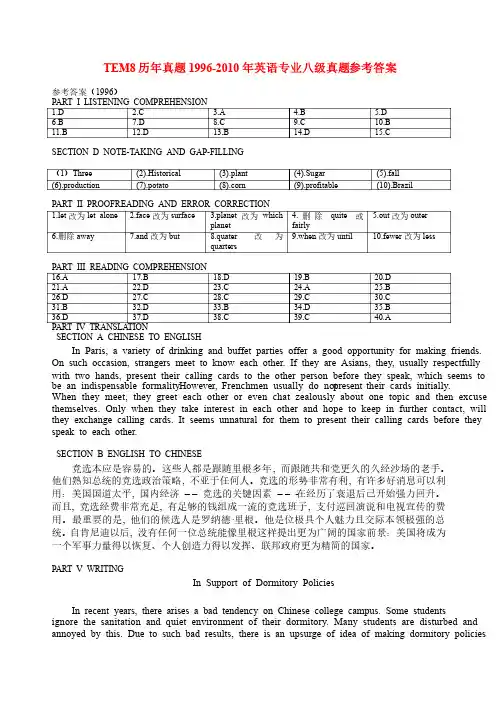
TEM8历年真题1996-2010年英语专业八级真题参考答案参考答案(1996)PART I LISTENING COMPREHENSION 1.D 2.C 3.A 4.B 5.D 6.B 7.D 8.C 9.C 10.B 11.B 12.D 13.B 14.D 15.C SECTION D NOTE-TAKING AND GAP-FILLING (1)Three (2).Historical (3).plant (4).Sugar (5).fall (6).production (7).potato (8).corn (9).profitable (10).Brazil PART II PROOFREADING AND ERROR CORRECTION 1.let 改为let alone 2.face 改为surface 3.planet 改为which planet 4.删除quite 或 fairly 5.out 改为outer 6.删除away 7.and 改为but 8.quater 改为quarters 9.when 改为until 10.fewer 改为less PART III READING COMPREHENSION 16.A 17.B 18.D 19.B 20.D 21.A 22.D 23.C 24.A 25.B 26.D 27.C 28.C 29.C 30.C 31.B 32.D 33.B 34.D 35.B 36.D 37.D 38.C 39.C 40.A PART IV TRANSLA TION SECTION A CHINESE TO ENGLISH In Paris, a variety of drinking and buffet parties offer a good opportunity for making friends. On such occasion, strangers meet to know each other. If they are Asians, they, usually respectfully with two hands, present their calling cards to the other person before they speak, which seems to be an indispensable formality. However, However, Frenchmen usually do not Frenchmen usually do not present present their cards initially. their cards initially. When they meet, they greet each other or even chat zealously about one topic and then excuse themselves. Only when they take interest in each other and hope to keep in further contact, will they exchange calling cards. It seems unnatural for them to present their calling cards before they speak to each other. SECTION B ENGLISH TO CHINESE 竞选本应是容易的。
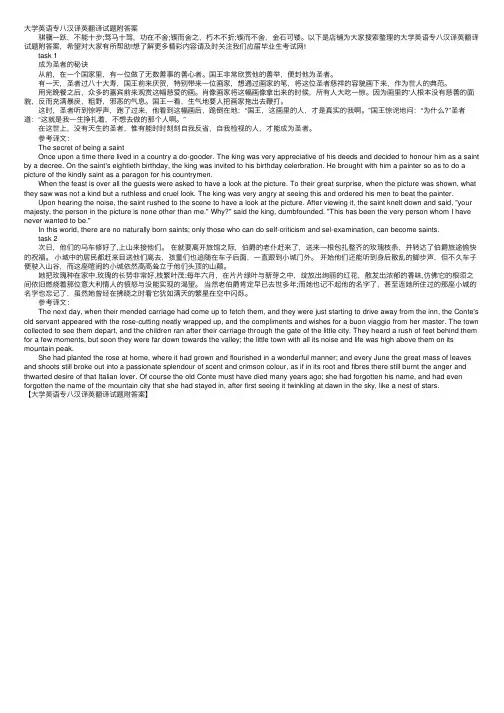
⼤学英语专⼋汉译英翻译试题附答案 骐骥⼀跃,不能⼗步;驽马⼗驾,功在不舍;锲⽽舍之,朽⽊不折;锲⽽不舍,⾦⽯可镂。
以下是店铺为⼤家搜索整理的⼤学英语专⼋汉译英翻译试题附答案,希望对⼤家有所帮助!想了解更多精彩内容请及时关注我们应届毕业⽣考试⽹! task 1 成为圣者的秘诀 从前,在⼀个国家⾥,有⼀位做了⽆数善事的善⼼者。
国王⾮常欣赏他的善举,便封他为圣者。
有⼀天,圣者过⼋⼗⼤寿,国王前来庆贺,特别带来⼀位画家,想通过画家的笔,将这位圣者慈祥的容貌画下来,作为世⼈的典范。
⽤完晚餐之后,众多的嘉宾前来观赏这幅慈爱的画。
肖像画家将这幅画像拿出来的时候,所有⼈⼤吃⼀惊。
因为画⾥的'⼈根本没有慈善的⾯貌,反⽽充满暴戾,粗野,邪恶的⽓息。
国王⼀看,⽣⽓地要⼈把画家拖出去鞭打。
这时,圣者听到惊呼声,跑了过来,他看到这幅画后,跪倒在地:“国王,这画⾥的⼈,才是真实的我啊。
”国王惊诧地问:“为什么?”圣者道:“这就是我⼀⽣挣扎着,不想去做的那个⼈啊。
” 在这世上,没有天⽣的圣者,惟有能时时刻刻⾃我反省,⾃我检视的⼈,才能成为圣者。
参考译⽂: The secret of being a saint Once upon a time there lived in a country a do-gooder. The king was very appreciative of his deeds and decided to honour him as a saint by a decree. On the saint's eightieth birthday, the king was invited to his birthday celerbration. He brought with him a painter so as to do a picture of the kindly saint as a paragon for his countrymen. When the feast is over all the guests were asked to have a look at the picture. To their great surprise, when the picture was shown, what they saw was not a kind but a ruthless and cruel look. The king was very angry at seeing this and ordered his men to beat the painter. Upon hearing the noise, the saint rushed to the scene to have a look at the picture. After viewing it, the saint knelt down and said, "your majesty, the person in the picture is none other than me." Why?" said the king, dumbfounded. "This has been the very person whom I have never wanted to be." In this world, there are no naturally born saints; only those who can do self-criticism and sel-examination, can become saints. task 2 次⽇,他们的马车修好了,上⼭来接他们。
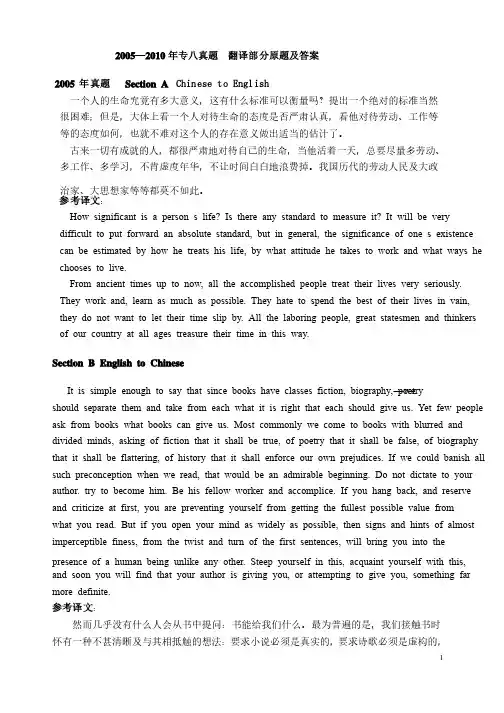
2005—2010年专八真题 翻译部分原题及答案2005 年真题 Section A Chinese to English一个人的生命究竟有多大意义,这有什么标准可以衡量吗?提出一个绝对的标准当然很困难;但是,大体上看一个人对待生命的态度是否严肃认真,看他对待劳动、工作等等的态度如何,也就不难对这个人的存在意义做出适当的估计了。
古来一切有成就的人,都很严肃地对待自己的生命,当他活着一天,总要尽量多劳动、多工作、多学习,不肯虚度年华,不让时间白白地浪费掉。
我国历代的劳动人民及大政治家、大思想家等等都莫不如此。
治家、大思想家等等都莫不如此。
参考译文:How significant is a person s life? Is there any standard to measure it? It will be very difficult to put forward an absolute standard, but in general, the significance of one s existence can be estimated by how he treats his life, by what attitude he takes to work and what ways he chooses to live. From ancient times up to now, all the accomplished people treat their lives very seriously. They work and, learn as much as possible. They hate to spend the best of their lives in vain, they do not want to let their time slip by. All the laboring people, great statesmen and thinkers of our country at all ages treasure their time in this way. Section B English to ChineseIt is simple enough to say that since books have classes fiction, biography, poetry—we should separate them and take from each what it is right that each should give us. Yet few people ask from books what books can give us. Most commonly we come to books with blurred and divided minds, asking of fiction that it shall be true, of poetry that it shall be false, of biography that it shall be flattering, of history that it shall enforce our own prejudices. If we could banish all such preconception when we read, that would be an admirable beginning. Do not dictate to your author. try to become him. Be his fellow worker and accomplice. If you hang back, and reserve and criticize at first, you are preventing yourself from getting the fullest possible value from what you read. But if you open your mind as widely as possible, then signs and hints of almost imperceptible finess, from the twist and turn of the first sentences, will bring you into the presence of a human being unlike any other. Steep yourself in this, acquaint yourself with this, and soon you will find that your author is giving you, or attempting to give you, something far more definite. 参考译文:然而几乎没有什么人会从书中提问:书能给我们什么。
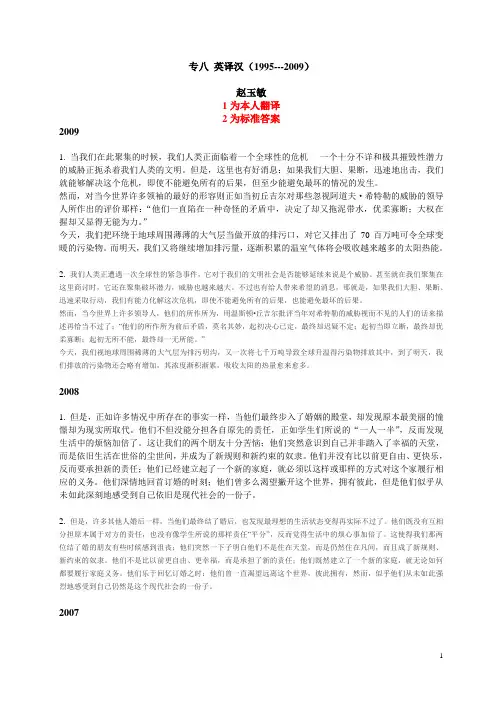
专八英译汉(1995---2009)赵玉敏1为本人翻译2为标准答案20091. 当我们在此聚集的时候,我们人类正面临着一个全球性的危机----一个十分不详和极具摧毁性潜力的威胁正扼杀着我们人类的文明。
但是,这里也有好消息:如果我们大胆、果断,迅速地出击,我们就能够解决这个危机,即使不能避免所有的后果,但至少能避免最坏的情况的发生。
然而,对当今世界许多领袖的最好的形容则正如当初丘吉尔对那些忽视阿道夫·希特勒的威胁的领导人所作出的评价那样:“他们一直陷在一种奇怪的矛盾中,决定了却又拖泥带水,优柔寡断;大权在握却又显得无能为力。
”今天,我们把环绕于地球周围薄薄的大气层当做开放的排污口,对它又排出了70百万吨可令全球变暖的污染物。
而明天,我们又将继续增加排污量,逐渐积累的温室气体将会吸收越来越多的太阳热能。
2. 我们人类正遭遇一次全球性的紧急事件,它对于我们的文明社会是否能够延续来说是个威胁。
甚至就在我们聚集在这里商讨时,它还在聚集破坏潜力,威胁也越来越大。
不过也有给人带来希望的消息,那就是,如果我们大胆、果断、迅速采取行动,我们有能力化解这次危机,即使不能避免所有的后果,也能避免最坏的后果。
然而,当今世界上许多领导人,他们的所作所为,用温斯顿•丘吉尔批评当年对希特勒的威胁视而不见的人们的话来描述再恰当不过了:“他们的所作所为前后矛盾,莫名其妙,起初决心已定,最终却迟疑不定;起初当即立断,最终却优柔寡断;起初无所不能,最终却一无所能。
”今天,我们视地球周围稀薄的大气层为排污明沟,又一次将七千万吨导致全球升温得污染物排放其中,到了明天,我们排放的污染物还会略有增加,其浓度渐积渐累,吸收太阳的热量愈来愈多。
20081. 但是,正如许多情况中所存在的事实一样,当他们最终步入了婚姻的殿堂,却发现原本最美丽的憧憬却为现实所取代。
他们不但没能分担各自原先的责任,正如学生们所说的“一人一半”,反而发现生活中的烦恼加倍了。
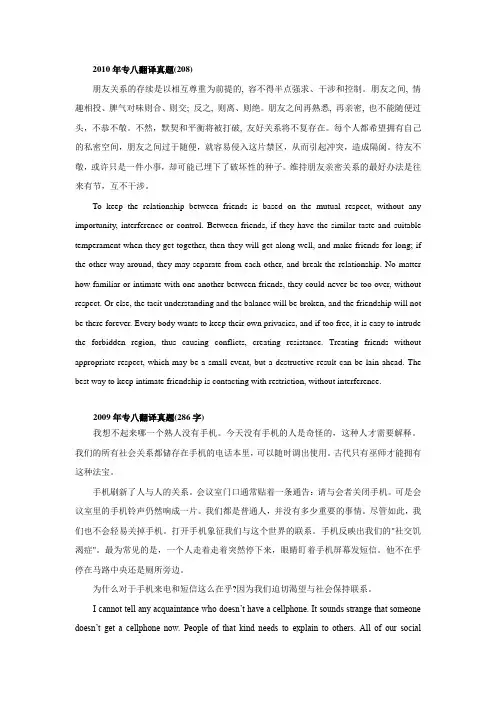
2010年专八翻译真题(208)朋友关系的存续是以相互尊重为前提的, 容不得半点强求、干涉和控制。
朋友之间, 情趣相投、脾气对味则合、则交; 反之, 则离、则绝。
朋友之间再熟悉, 再亲密, 也不能随便过头,不恭不敬。
不然,默契和平衡将被打破, 友好关系将不复存在。
每个人都希望拥有自己的私密空间,朋友之间过于随便,就容易侵入这片禁区,从而引起冲突,造成隔阂。
待友不敬,或许只是一件小事,却可能已埋下了破坏性的种子。
维持朋友亲密关系的最好办法是往来有节,互不干涉。
To keep the relationship between friends is based on the mutual respect, without any importunity, interference or control. Between friends, if they have the similar taste and suitable temperament when they get together, then they will get along well, and make friends for long; if the other way around, they may separate from each other, and break the relationship. No matter how familiar or intimate with one another between friends, they could never be too over, without respect. Or else, the tacit understanding and the balance will be broken, and the friendship will not be there forever. Every body wants to keep their own privacies, and if too free, it is easy to intrude the forbidden region, thus causing conflicts, creating resistance. Treating friends without appropriate respect, which may be a small event, but a destructive result can be lain ahead. The best way to keep intimate friendship is contacting with restriction, without interference.2009年专八翻译真题(286字)我想不起来哪一个熟人没有手机。
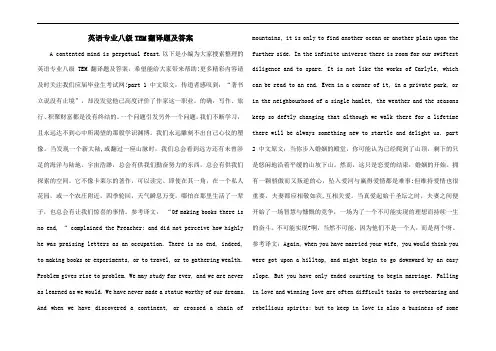
英语专业八级TEM翻译题及答案A contented mind is perpetual feast.以下是小编为大家搜索整理的英语专业八级TEM翻译题及答案,希望能给大家带来帮助!更多精彩内容请及时关注我们应届毕业生考试网!part 1中文原文:传道者感叹到:“著书立说没有止境”,却没发觉他已高度评价了作家这一职业。
的确,写作、旅行、积聚财富都是没有终结的。
一个问题引发另外一个问题。
我们不断学习,且永远达不到心中所渴望的那般学识渊博。
我们永远雕刻不出自己心仪的塑像。
当发现一个新大陆,或翻过一座山脉时,我们总会看到远方还有未曾涉足的海洋与陆地。
宇宙浩渺,总会有供我们勤奋努力的东西,总会有供我们探索的空间。
它不像卡莱尔的著作,可以读完。
即使在其一角,在一个私人花园,或一个农庄附近,四季轮回,天气瞬息万变,哪怕在那里生活了一辈子,也总会有让我们惊喜的事情。
参考译文:“Of making books there is no end, “ complained the Preacher; and did not perceive how highly he was praising letters as an occupation. There is no end, indeed, to making books or experiments, or to travel, or to gathering wealth. Problem gives rise to problem. We may study for ever, and we are never as learned as we would. We have never made a statue worthy of our dreams. And when we have discovered a continent, or crossed a chain of mountains, it is only to find another ocean or another plain upon the further side. In the infinite universe there is room for our swiftest diligence and to spare. It is not like the works of Carlyle, which can be read to an end. Even in a corner of it, in a private park, or in the neighbourhood of a single hamlet, the weather and the seasons keep so deftly changing that although we walk there for a lifetime there will be always something new to startle and delight us. part 2中文原文:当你步入婚姻的殿堂,你可能认为已经爬到了山顶,剩下的只是悠闲地沿着平缓的山坡下山。
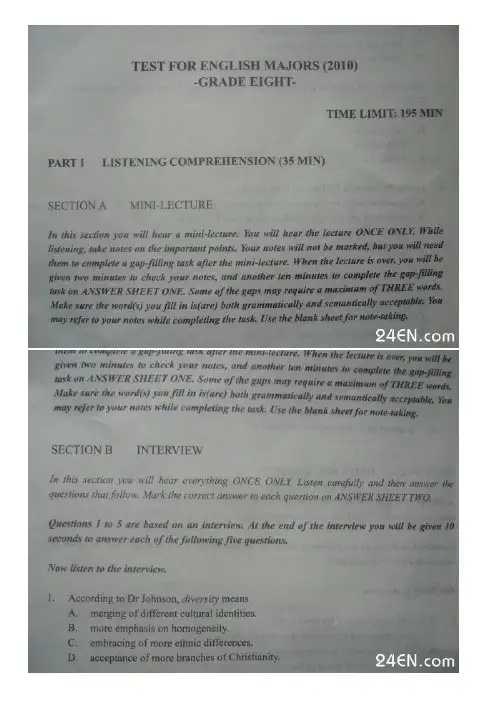
今年的讲座名为“Paralinguistic Features of Languages”,主题是辅助语言学,对于英语专业的学生来说,这个话题或许没有专门学过,但并不陌生。
讲座类的内容非常突出的特点就是逻辑性强,思路很清晰,所以在听音频做笔记的时候,要特别注意总起性质的句子。
一般来说lecture的第一段会对接下来的内容做总结介绍,如果下文划分成若干个小类别,会概括性地提到这些类别,然后在后文进行详细的例证、再分类。
第一段对给考生一个宏观性的思路非常重要,听漏掉一两点也没关系,下文必然会重新提到。
本次真题的听力原文如下,注意文章中标粗的部分,是记笔记的重点部分:Paralinguistic features of languagesGood morning, everyone. Today we'll continue our discussion on describing language. Last week we examined such features of language as grammar, vocabulary, the sounds of language, etc. In this lecture, we'll look at another important aspect of language. Perhaps some of you may wonder what is this important aspect of language. Let me tell you. It refers to features of communication that takes place without the use of grammar and vocabulary. They are called …paralinguistic features of language'. These features fall into two broad categories: those that involve voice and those that involve the body.Now, the first category, is what we call vocal paralinguistic features. V ocal features are actually tones of voice. While they are, perhaps, not central to meaning in communication in the same way as grammar or vocabulary, they may, nevertheless, convey attitude or intention in some way. Let me give you some examples. The first is whispering, which indicates the needs for secrecy. The second is breathiness. This is to show deep emotion. The third is huskiness, which is to show unimportants. The fourth is nasality. This is to indicate anxiety. The last is extra lip-rounding, which expresses greater intimacy, expecially with babies, for example. So we can see that there are a number of ways of altering our tone of voice. And when we do this consciously, we do it to create different effects in communication.Now, let's come to the second category, physical paralinguistic features, which involves the body. In addition to convey meanings with tone of voice, we can also express our intentions through the ways in which we use our bodies. You may ask: what are the ways, then? Let me sight some brief examples. The expression on ourface, the gestures we make and even proximity or way we sit, are some of the ways we send powerful messages. About how we feel, or what we mean. Let me explain some of these in more detail. First, facial expression. Facial expression is a powerful conveyer of meaning. We all know smiling is an almost universal signal of pleasure or welcome. But there are other facial expressions that may not be so common. For instance, raising eye-brows - suggest that you are surprised or interested in something. Other facial actions, such as biting your lip, which indicates that you are deep in thinking, or are uncertain about something; compressing the lips, which show that you are making decisions; and a visible clenching of the teeth, to show that you are angry, are all powerful conveyers of meaning, too. The second in this category is gesture. You see, we use gesture to indicate a wide range of meanings. Though I have to emphasize that the actual gestures we use may be specific to particular cultures. That is to say different cultures have their own favorite gestures in conveying meaning. Here, a few examples may show you how powerful gestures can be. In British English behavior, shrugging shoulders may indicate an attit ude of …I don't care', or …I don't know'. Crossing your arms may indicate relaxation. But it can also powerfully show you are bored. Waving can mean welcome and farewell. While scratching your head may indicate that you are at a loss. In other cultures, placing your hand upon your heart is to indicate that you are telling the truth. Pointing your finger at your nose means it's a secret. That's why we say that gestures are culture bound. The third is proximity, posture and echoing. Proximity refers to the physical distance between speakers. This can indicate a number of things and can also be used to consciously send messages about intent. Closeness, for example, indicates intimacy or threat to many speakers. But distance may show formality, or lack of interest. Once again, I'd like to say, proximity is also both a matter of personal style, and is often culture bound. So, what may seem normal to a speaker from one culture may appear unnecessarily close or distant to a speaker from another. And standing close to someone may be quite appropriate in some situations such as an informal party, but completely out of place in other situations, such as a meeting with a superior. Next, posture. Posture means the way in which someone holds his or her body, especially the back, shoulders and head, when standing, walking or sitting. A few examples. Hunched shoulders and a hanging head give a powerful indication of whether the person is happy or not. A lowered head when speaking to a superior, with or without eye contact can convey the appropriate relationship in some cultures. On the other hand, direct level eye contact, changes the nature of interaction, and can been seen as either open or challenging. Last, echoing. Now, what is echoing? Let me start with an example. Some of you may have noticed this phenomenon in your experience. When two people are keen to agree each other, they would likely, though unconsciously adopt the same posture, as if an imitation of each other. They sit or stand in the same manor. When used in this way, echoing appears to complement the verbal communication. Of course, when such imitation is carried out consciously, it often indicates that someone is marking at another speaker.Ok, in today's lecture, we looked at some paralinguistic features, such as tone of voice, gesture and posture. These features, together with linguistic features of language, like grammar, or vocabulary, are all part of the way we communicate with each other in face to face encounters. In our next lecture, we'll watch some video material, and see how people actually use paralinguistic means in communication to express their intention or desire or mood.整理一下,整篇文章的要点非常清晰:I. V ocal Paralinguistic Features1. whispering- the needs for secrecy2. breathiness- deep emotion3. huskiness- unimportants4. nasality- anxiety5. extra lip-rounding- greater intimacyII. physical paralinguistic features1. facial expression- powerful conveyer of meaning.--e.g.1 smiling: pleasure or welcome--e.g.2 raising eye-brows: surprised or interested in something--e.g.3 biting your lip:deep in thinking/ uncertain about something--e.g.4 compressing the lips: making decisions--e.g.5 clenching of the teeth: angry2. gesture- culture bound--e.g.1 shrugging shoulders: 'I don't care', or 'I don't know'--e.g.2 crossing your arms: relaxation/ bored--e.g.3 waving: welcome and farewell--e.g.4 scratching your head: at a loss--e.g.5 placing your hand upon your heart: telling the truth--e.g.6 pointing your finger at your nose: it's a secret3. proximity, posture and echoing1). proximity: personal style & culture bound--e.g.1 closeness: intimacy, threat--e.g.2 distance: fomality, lack of interest2). posture: the way in which someone holds his or her body--e.g.1 Hunched shoulders and a hanging head: happy or not--e.g.2 A lowered head, eye contact: the appropriate relationship--e.g.3 direct level eye contact: open or challenging3). echoing: to complement the verbal communication运用各种自己熟悉的笔记符号,将上述列表中的内容快速记下来,只可以更少,不能更多。
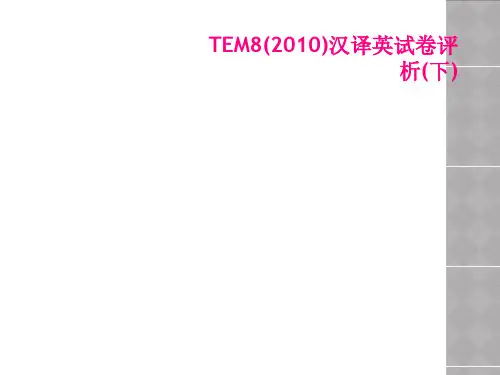
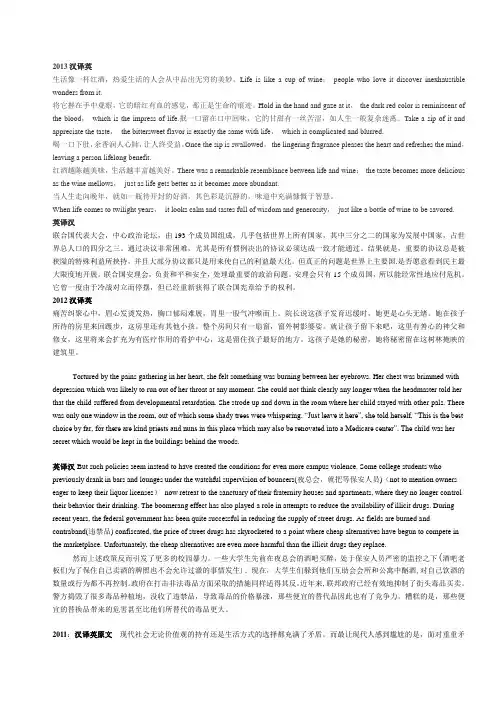
2013汉译英生活像一杯红酒,热爱生活的人会从中品出无穷的美妙。
Life is like a cup of wine;people who love it discover inexhaustible wonders from it.将它握在手中观察,它的暗红有血的感觉,那正是生命的痕迹。
Hold in the hand and gaze at it,the dark red color is reminiscent of the blood,which is the impress of life.抿一口留在口中回味,它的甘甜有一丝苦涩,如人生一般复杂迷离。
Take a sip of it and appreciate the taste,the bittersweet flavor is exactly the same with life,which is complicated and blurred.喝一口下肚,余香润人心肺,让人终受益。
Once the sip is swallowed,the lingering fragrance pleases the heart and refreshes the mind,leaving a person lifelong benefit.红酒越陈越美味,生活越丰富越美好。
There was a remarkable resemblance between life and wine:the taste becomes more delicious as the wine mellows,just as life gets better as it becomes more abundant.当人生走向晚年,就如一瓶待开封的好酒,其色彩是沉静的,味道中充满慷慨于智慧。
When life comes to twilight years,it looks calm and tastes full of wisdom and generosity,just like a bottle of wine to be savored.英译汉联合国代表大会,中心政治论坛,由193个成员国组成,几乎包括世界上所有国家,其中三分之二的国家为发展中国家,占世界总人口的四分之三。
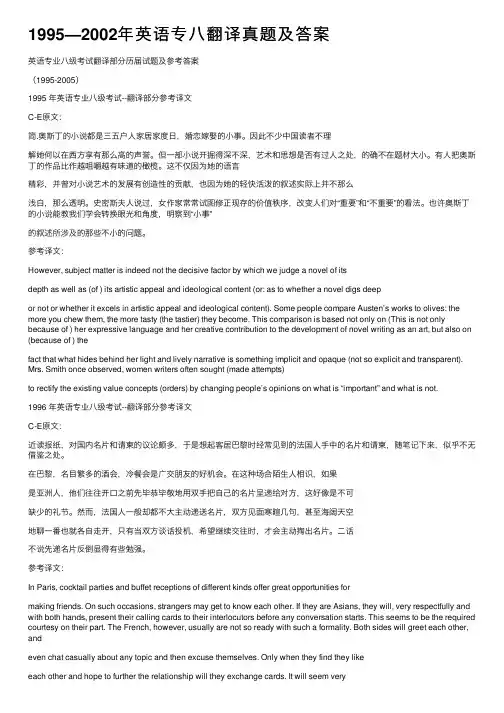
1995—2002年英语专⼋翻译真题及答案英语专业⼋级考试翻译部分历届试题及参考答案(1995-2005)1995 年英语专业⼋级考试--翻译部分参考译⽂C-E原⽂:简.奥斯丁的⼩说都是三五户⼈家居家度⽇,婚恋嫁娶的⼩事。
因此不少中国读者不理解她何以在西⽅享有那么⾼的声誉。
但⼀部⼩说开掘得深不深,艺术和思想是否有过⼈之处,的确不在题材⼤⼩。
有⼈把奥斯丁的作品⽐作越咀嚼越有味道的橄榄。
这不仅因为她的语⾔精彩,并曾对⼩说艺术的发展有创造性的贡献,也因为她的轻快活泼的叙述实际上并不那么浅⽩,那么透明。
史密斯夫⼈说过,⼥作家常常试图修正现存的价值秩序,改变⼈们对“重要”和“不重要”的看法。
也许奥斯丁的⼩说能教我们学会转换眼光和⾓度,明察到“⼩事”的叙述所涉及的那些不⼩的问题。
参考译⽂:However, subject matter is indeed not the decisive factor by which we judge a novel of itsdepth as well as (of ) its artistic appeal and ideological content (or: as to whether a novel digs deepor not or whether it excels in artistic appeal and ideological content). Some people compare Austen’s works to olives: the more you chew them, the more tasty (the tastier) they become. This comparison is based not only on (This is not only because of ) her expressive language and her creative contribution to the development of novel writing as an art, but also on (because of ) thefact that what hides behind her light and lively narrative is something implicit and opaque (not so explicit and transparent). Mrs. Smith once observed, women writers often sought (made attempts)to rectify the existing value concepts (orders) by changing people’s opinions on what is “important” and what is not.1996 年英语专业⼋级考试--翻译部分参考译⽂C-E原⽂:近读报纸,对国内名⽚和请柬的议论颇多,于是想起客居巴黎时经常见到的法国⼈⼿中的名⽚和请柬,随笔记下来,似乎不⽆借鉴之处。
2010英语专八真题TEST FOR ENGLISH MAJORS (2010)-GRADE EIGHT-PART I LISTENING COMPREHENSION (35 MIN)SECTION A MINI-LECTUREIn this section you will hear a mini-lecture. You will hear the lecture ONCE ONLY. While listening, take notes on the important points. Your notes will not be marked, but you will need them to complete a gap-filling task after the mini-lecture. When the lecture is over, you will be given two minutes to check your notes, and another ten minutes to complete the gap-filling task on ANSWER SHEET ONE. Use the blank sheet for note-taking.Complete the gap-filling task. Some of the gaps below may require a maximum of THREE words. Make sure the word(s) you fill in is (are) both grammatically & semantically acceptable. You may refer to your notes.Paralinguistic Features of LanguageIn face-to-face communication speakers often alter their tomes of voice or change their physical postures in order to convey messages. These means are called paralinguistic features of language, which fall into two categories.First category: vocal paralinguistic featuresA.(1)__________: to express attitude or intention (1)__________B.Examples1. whispering: need for secrecy2. breathiness: deep emotion3. (2)_________: unimportance (2)__________4. nasality: anxiety5. extra lip-rounding: greater intimacySecond category: physical paralinguistic featuresA.facial expressions1.(3)_______ (3)__________----- smiling: signal of pleasure or welcome2.less common expressions----- eye brow raising: surprise or interest----- lip biting: (4)________ (4)_________B.gesturegestures are related to culture.1.British culture----- shrugging shoulders: (5) ________ (5)__________----- scratching head: puzzlement2.other cultures----- placing hand upon heart:(6)_______ (6)__________----- pointing at nose: secretC.proximity, posture and echoing1.proximity: physical distance between speakers----- closeness: intimacy or threat----- (7)_______: formality or absence of interest (7)_________Proximity is person-, culture- and (8)________ -specific. (8)_________2.posture----- hunched shoulders or a hanging head: to indicate(9)_____ (9)________----- direct level eye contact: to express an open or challenging attitude3.echoing----- definition: imitation of similar posture----- (10)______: aid in communication (10)___________----- conscious imitation: mockerySECTION B INTERVIEWIn this section you will hear everything ONCE ONLY. Listen carefully and then answer the questions that follow. Mark the correct answer to each question on ANSWER SHEET TWO.Questions 1 to 5 are based on an interview. At the end of the interview you will be given 10 seconds to answer each of the following five questions.Now listen to the interview.1. According to Dr Johnson, diversity meansA. merging of different cultural identities.B. more emphasis on homogeneity.C. embracing of more ethnic differences.D. acceptance of more branches of Christianity.2. According to the interview, which of the following statements in CORRECT?A. Some places are more diverse than others.B. Towns are less diverse than large cities.C. Diversity can be seen everywhere.D. American is a truly diverse country.3. According to Dr Johnson, which place will witness a radical change in its racial makeup by 2025?A. MaineB. SelinsgroveC. PhiladelphiaD. California4. During the interview Dr Johnson indicates thatA. greater racial diversity exists among younger populations.B. both older and younger populations are racially diverse.C. age diversity could lead to pension problems.D. older populations are more racially diverse.5. According to the interview, religious diversityA. was most evident between 1990 and 2000.B. exists among Muslim immigrants.C. is restricted to certain places in the US.D. is spreading to more parts of the country.SECTION C NEWS BROADCASTIn this section you will hear everything ONCE ONLY. Listen carefully and then answer the questions that follow. Mark the correct answer to each question on your coloured answer sheet.Question 6 is based on the following news. At the end of the news item, you will be given 10 seconds to answer the question.Now listen to the news.6. What is the main idea of the news item?A. Sony developed a computer chip for cell phones.B. Japan will market its wallet phone abroad.C. The wallet phone is one of the wireless innovations.D. Reader devices are available at stores and stations.Question 7 and 8 is based on the following news. At the end of the news item, you will be given 20 seconds to answer the questions.Now listen to the news.7. Which of the following is mentioned as the government’s measure to control inflation?A. Foreign investment.B. Donor support.C. Price control.D. Bank prediction.8. According to Kingdom Bank, what is the current inflation rate in Zimbabwe?A. 20 million percent.B. 2.2 million percent.C. 11.2 million percent.D. Over 11.2 million percent.Question 9 and 10 are based on the following news. At the end of the news item, you will be given 20 seconds to answer the question.Now listen to the news.9. Which of the following is CORRECT?A. A big fire erupted on the Nile River.B. Helicopters were used to evacuate people.C. Five people were taken to hospital for burns.D. A big fire took place on two floors.10. The likely cause of the big fire isA. electrical short-cut.B. lack of fire-satefy measures.C. terrorism.D. not known.PART II READING COMPREHENSION (30 MIN)In this section there are four reading passages followed by a total of 20 multiple-choice questions. Read the passages and then mark your answers on your coloured answer sheet.TEXT AStill, the image of any city has a half-life of many years. (So does its name, officially changed in 2001 from Calcutta to Kolkata, which is closer to what the word sounds like in Bengali. Conversing in English, I never heard anyone call the city anything but Calcutta.) To Westerners, the conveyance most identified with Kolkata is not its modern subway—a facility whose spacious stations have art on the walls and cricket matches on television monitors—but the hand-pulled rickshaw. Stories and films celebrate a primitive-looking cart with high wooden wheels, pulled by someone who looks close to needing the succor of Mother Teresa. For years the government has been talking about eliminating hand-pulled rickshaws on what it calls humanitarian grounds—principally on the ground that, as the ma yor of Kolkata has often said, it is offensive to see “one man sweating and straining to pull another man.” But these days politicians also lament the impact of 6,000 hand-pulled rickshaws on a modern city’s traffic and, particularly, on its image. “Wester ners try to associate beggars and these rickshaws with the Calcutta landscape, but this is not what Calcutta stands for,” the chief minister of West Bengal, Buddhadeb Bhattacharjee, said in a press conference in 2006. “Our city stands for prosperity and development.” The chief minister—theequivalent of a state governor—went on to announce that hand-pulled rickshaws soon would be banned from the streets of Kolkata.Rickshaws are not there to haul around tourists. (Actually, I saw almost no tourists in Kolkata, apart from the young backpackers on Sudder Street, in what used to be a red-light district and is now said to be the single place in the city where the services a rickshaw puller offers may include providing female company to a gentleman for the evenin g.) It’s the people in the lanes who most regularly use rickshaws—not the poor but people who are just a notch above the poor. They are people who tend to travel short distances, through lanes that are sometimes inaccessible to even the most daring taxi driver. An older woman with marketing to do, for instance, can arrive in a rickshaw, have the rickshaw puller wait until she comes back from various stalls to load her purchases, and then be taken home. People in the lanes use rickshaws as a 24-hour ambulance service. Proprietors of cafés or corner stores send rickshaws to collect their supplies. (One morning I saw a rickshaw puller take on a load of live chickens—tied in pairs by the feet so they could be draped over the shafts and the folded back canopy and even the axle. By the time he trotted off, he was carrying about a hundred upside-down chickens.) The rickshaw pullers told me their steadiest customers are schoolchildren. Middle-class families contract with a puller to take a child to school and pick him up; the puller essentially becomes a family retainer.From June to September Kolkata can get torrential rains, and its drainage system doesn’t need torrential rain to begin backing up. Residents who favor a touch of hyperbole say that in Kolkata “if a stray cat pees, there’s a flood.” During my stay it once rained for about 48 hours. Entire neighborhoods couldn’t be reached by motorized vehicles, and the newspapers showed pictures of rickshaws being pulled through water that was up to the pullers’ waists. When it’s raining, the normal customer base for rickshaw pullers expands greatly, as does the price of a journey. A writer in Kolkata told me, “When it rains, even the governor takes rickshaws.”While I was in Kolkata, a magazine called India Today published its annual ranking of Indian states, according to such measurements as prosperity and infrastructure. Among India’s 20 largest states, Bihar finished dead last, as it has for four of the past five years. Bihar, a couple hundred miles north of Kolkata, is where the vast majority of rickshaw pullers come from. Once in Kolkata, they sleep on the street or in their rickshaws or in a dera—a combination garage and repair shop and dormitory managed by someone called a sardar. For sleeping privileges in a dera, pullers pay 100 rupees (about $2.50) a month, which sounds like a pretty good deal until you’ve visited a dera. They gross between 100 and 150 rupees a day, out of which they have to pay 20 rupees for the use of the rickshaw and an occasional 75 or more for a payoff if a policeman stops them for, say, crossing a street where rickshaws are prohibited. A 2003 study found that rickshaw pullers are near the bottom of Kolkata occupations in income, doing better than only the ragpickers and the beggars. For someone without land or education, that still beats trying to make a living in Bihar.There are people in Kolkata, particularly educated and politically aware people, who will not ride in a rickshaw, because they are offended by the idea of being pulled by another human being or because they consider it not the sort of thing people of their station do or because they regard the hand-pulled rickshaw as a relic of colonialism. Ironically, some of those people are not enthusiastic about banning rickshaws. The editor of the editorial pages of Kolkata’s Telegraph—Rudrangshu Mukherjee, a former academic who still writes history books—told me, for instance, that he sees humanitarian considerations as coming down on the side of keeping hand-pulled rickshaws on the road. “I refuse to be carried by another human being myself,” he said, “but I question whether we have the right to take away their livelihood.” Rickshaw supporters point out that when it comes to demeaning occupations, rickshaw pullers are hardly unique in Kolkata.When I asked one rickshaw puller if he thought the government’s plan to rid the city of rickshaws was based on a genuine interest in his welfare, he smiled, with a quick shake of his head—a gesture I interpreted to mean, “Ifyou are so naive as to as k such a question, I will answer it, but it is not worth wasting words on.” Some rickshaw pullers I met were resigned to the imminent end of their livelihood and pin their hopes on being offered something in its place. As migrant workers, they don’t have the political clout enjoyed by, say, Kolkata’s sidewalk hawkers, who, after supposedly being scaled back at the beginning of the modernization drive, still clog the sidewalks, selling absolutely everything—or, as I found during the 48 hours of rain, absolut ely everything but umbrellas. “The government was the government of the poor people,” one sardar told me. “Now they shake hands with the capitalists and try to get rid of poor people.”But others in Kolkata believe that rickshaws will simply be confined more strictly to certain neighborhoods, out of the view of World Bank traffic consultants and California investment delegations—or that they will be allowed to die out naturally as they’re supplanted by more modern conveyances. Buddhadeb Bhattacharjee, after all, is not the first high West Bengal official to say that rickshaws would be off the streets of Kolkata in a matter of months. Similar statements have been made as far back as 1976. The ban decreed by Bhattacharjee has been delayed by a court case and by a widely held belief that some retraining or social security settlement ought to be offered to rickshaw drivers. It may also have been delayed by a quiet reluctance to give up something that has been part of the fabric of the city for more than a century. Kolkata, a resident told me, “has difficulty letting go.” One day a city official handed me a report from the municipal government laying out options for how rickshaw pullers might be rehabilitated.“Which option has been chosen?” I asked, noting that th e report was dated almost exactly a year before my visit.“That hasn’t been decided,” he said.“When will it be decided?”“That hasn’t been decided,” he said.11. According to the passage, rickshaws are used in Kolkata mainly for the following EXCEPTA. taking foreign tourists around the city.B. providing transport to school children.C. carrying store supplies and purchasesD. carrying people over short distances.12. Which of the following statements best describes the rickshaw pullers from Bihar?A. They come from a relatively poor area.B. They are provided with decent accommodation.C. Their living standards are very low in Kolkata.D. They are often caught by policemen in the streets.13. That “For someone without land or education, that still beats trying to make a living in Bihar” (4 paragraph)means that even so,A. the poor prefer to work and live in Bihar.B. the poor from Bihar fare better than back home.C. the poor never try to make a living in Bihar.D. the poor never seem to resent their life in Kolkata.14. We can infer from the passage that some educated and politically aware peopleA. hold mixed feelings towards rickshaws.B. strongly support the ban on rickshaws.C. call for humanitarian actions fro rickshaw pullers.D. keep quiet on the issue of banning rickshaws.15. Which of the following statements conveys the author’s sense of humor?A. “…not the poor but people who are just a notch above the poor.” (2 paragraph)B. “…,.which sounds like a pretty good deal until you’ve visited a dera.” (4 paragraph)C. Kolkata, a resident told me, “ has difficulty letting go.” (7 paragraph).D.“…or, as I found during the 48 hours of rain, absolutely everything but umbrellas.” (6 paragraph)16. The dialogue between the author and the city official at the end of the passage seems to suggestA. the uncertainty of the court’s decision.B. the inefficiency of the municipal government.C. the difficulty of finding a good solution.D. the slowness in processing options.TEXT BDepending on whom you believe, the average American will, over a lifetime, wait in lines for two years (says National Public Radio) or five years (according to customer-loyalty experts).The crucial word is average, as wealthy Americans routinely avoid lines altogether. Once the most democratic of institutions, lines are rapidly becoming the exclusive province of suckers(people who still believe in and practice waiting in lines). Poor suckers, mostly.Airports resemble France before the Revolution: first-class passengers enjoy "élite" security lines and priority boarding, and disembark before the unwashed in coach, held at bay by a flight attendant, are allowed to foul the Jetway.At amusement parks, too, you can now buy your way out of line. This summer I haplessly watched kids use a $52 Gold Flash Pass to jump the lines at Six Flags New England, and similar systems are in use in most major American theme parks, from Universal Orlando to Walt Disney World, where the haves get to watch the have-mores breeze past on their way to their seats.Flash Pass teaches children a valuable lesson in real-world economics: that the rich are more important than you, especially when it comes to waiting. An NBA player once said to me, with a bemused chuckle of disbelief, that when playing in Canada--get this--"we have to wait in the same customs line as everybody else."Almost every line can be breached for a price. In several U.S. cities this summer, early arrivers among the early adopters waiting to buy iPhones offered to sell their spots in the lines. On Craigslist, prospective iPhone purchasers offered to pay "waiters" or "placeholders" to wait in line for them outside Apple stores.Inevitably, some semi-populist politicians have seen the value of sort-of waiting in lines with the ordinary people. This summer Philadelphia mayor John Street waited outside an AT&T store from 3:30 a.m. to 11:30 a.m. before a stand-in from his office literally stood in for the mayor while he conducted official business. And billionaire New York mayor Michael Bloomberg often waits for the subway with his fellow citizens, though he's first driven by motorcade past the stop nearest his house to a station 22 blocks away, where the wait, or at least the ride, is shorter.As early as elementary school, we're told that jumping the line is an unethical act, which is why so many U.S. lawmakers have framed the immigration debate as a kind of fundamental sin of the school lunch line. Alabama Senator Richard Shelby, to cite just one legislator, said amnesty would allow illegal immigrants "to cut in line ahead of millions of people."Nothing annoys a national lawmaker more than a person who will not wait in line, unless that line is in front of an elevator at the U.S. Capitol, where Senators and Representatives use private elevators, lest they have to queue with their constituents.But compromising the integrity of the line is not just antidemocratic, it's out-of-date. There was something about the orderly boarding of Noah's Ark, two by two, that seemed to restore not just civilization but civility during the Great Flood.How civil was your last flight? Southwest Airlines has first-come, first-served festival seating. But for $5 per flight, an unaffiliated company called will secure you a coveted "A" boarding pass when that airline opens for online check-in 24 hours before departure. Thus, the savvy traveler doesn't even wait in line when he or she is online.Some cultures are not renowned for lining up. Then again, some cultures are too adept at lining up: a citizen of the former Soviet Union would join a queue just so he could get to the head of that queue and see what everyone was queuing for.And then there is the U.S., where society seems to be cleaving into two groups: Very Important Persons, who don't wait, and Very Impatient Persons, who do--unhappily.For those of us in the latter group-- consigned to coach, bereft of Flash Pass, too poor or proper to pay a placeholder --what do we do? We do what Vladimir and Estragon did in Waiting for Godot: "We wait. We are bored."17. What does the following sentence mean? “Once the most democratic of institutions, lines are rapidlybecoming the exclusive province of suckers…Poor suckers, mostly.” (2 paragraph)A. Lines are symbolic of America’s democracy.B. Lines still give Americans equal opportunities.C. Lines are now for ordinary Americans only.D. Lines are for people with democratic spirit only.18. Which of the following is NOT cited as an example of breaching the line?A. Going through the customs at a Canadian airport.B. Using Gold Flash Passes in amusement parks.C. First-class passenger status at airports.D. Purchase of a place in a line from a placeholder.19. We can infer from the passage that politicians (including mayors and Congressmen)A. prefer to stand in lines with ordinary people.B. advocate the value of waiting in lines.C. believe in and practice waiting in lines.D. exploit waiting in lines for their own good.20. What is the tone of the passage?A. Instructive.B. Humorous.C. Serious.D. Teasing.TEXT CA bus took him to the West End, where, among the crazy coloured fountains of illumination, shattering the blue dusk with green and crimson fire, he found the café of his choice, a tea-shop that had gone mad and turned. Bbylonian, a while palace with ten thousand lights. It towered above the other building like a citadel, which indeed it was, the outpost of a new age, perhaps a new civilization, perhaps a new barbarism; and behind the thin marble front were concrete and steel, just as behind the careless profusion of luxury were millions of pence, balanced to the last halfpenny. Somewhere in the background, hidden away, behind the ten thousand llights and acres of white napery and bewildering glittering rows of teapots, behind the thousand waitresses and cash-box girls and black-coated floor managers and temperamental long-haired violinists, behind the mounds of cauldrons of stewed steak, the vanloads of ices, were a few men who went to work juggling with fractions of a farming, who knew how many units of electricity it took to finish a steak-and-kidney pudding and how many minutes and seconds a waitress( five feet four in height and in average health) would need to carry a tray of given weight from the kitchen life to the table in the far corner. In short, there was a warm, sensuous, vulgar life flowering in the upper storeys, and a cold science working in the basement. Such as the gigantic tea-shop into which Turgis marched, in search not of mere refreshment but of all the enchantment of unfamiliar luxury. Perhaps he knew in his heart that men have conquered half the known world, looted whole kingdoms, and never arrived in such luxury. The place was built for him.It was built for a great many other people too, and, as usual, they were al there. It seemed with humanity. The marble entrance hall, piled dizzily with bonbons and cakes, was as crowded and bustling as a railway station. The gloom and grime of the streets, the raw air, all November, were at once left behind, forgotten: the atmosphere inside was golden, tropical, belonging to some high mid-summer of confectionery. Disdaining the lifts, Turgis, once more excited by the sight, sound, and smell of it all, climbed the wide staircase until he reached his favourite floor, whre an orchestra, led by a young Jewish violinist with wandering lustrous eyes and a passion for tremolo effects, acted as a magnet to a thousand girls, scented air, the sensuous clamour of the strings; and, as he stood hesitating a moment, half dazed, there came, bowing, s sleek grave man, older than he was and far more distinguished than he could ever hope to be, who murmured deferentially: “ For one, sir? This way, please,” Shyly, yet proudly, Turgis followed him.21. That “behind the thin marble front were concrete and steel” suggests thatA. modern realistic commercialism existed behind the luxurious appearance.B. there was a fundamental falseness in the style and the appeal of the café..C. the architect had made a sensible blend of old and new building materials.D. the café was based on physical foundations and real economic strength.22. The following words or phrases are somewhat critical of the tea-shop EXCEPTA. “…turned Babylonian”.B. “perhaps a new barbarism’.C. “acres of white napery”.D. “balanced to the last halfpenny”.23. In its context the statement that “ the place was built for him” means that the café was intended toA. please simple people in a simple way.B. exploit gullible people like him.C. satisfy a demand that already existed.D. provide relaxation for tired young men.24. Which of the following statements about the second paragraph is NOT true?A. The café appealed to most senses simultaneously.B. The café was both full of people and full of warmth.C. The inside of the café was contrasted with the weather outside.D. It stressed the commercial determination of the café owners.25. The following are comparisons made by the author in the second paragraph EXCEPT thatA. the entrance hall is compared to a railway station.B. the orchestra is compared to a magnet.C. Turgis welcomed the lift like a conquering soldier.D. the interior of the café is compared to warm countries.26. The author’s attitude to the café isA. fundamentally critical.B. slightly admiring.C. quite undecided.D. completely neutral.TEXT DI Now elsewhere in the world, Iceland may be spoken of, somewhat breathlessly, as western Europe’s last pristine wilderness. But the environmental awareness that is sweeping the world had bypassed the majority of Icelanders. Certainly they were connected to their land, the way one is complicatedly connected to, or encumbered by, family one can’t do anything about. But the truth is, once you’re off the beat-en paths of the low-lying coastal areas where everyone lives, the roads are few, and they’re all bad, so Iceland’s natural wonders have been out of reach and unknown even to its own inhab-itants. For them the land has always just been there, something that had to be dealt with and, if possible, exploited—the mind-set being one of land as commodity rather than land as, well, priceless art on the scale of the “Mona Lisa.”When the opportunity arose in 2003 for the national power company to enter into a 40-year contract with the American aluminum company Alcoa to supply hydroelectric power for a new smelter, those who had been dreaming of some-thing like this for decades jumped at it and never looked back. Iceland may at the moment be one of the world’s richest countries, with a 99 percent literacy rate and long life expectancy. But the proj-ect’s advocates, some of them getting on in years, were more emotionally attuned to the country’s century upon century of want, hardship, and colonial servitude to Denmark, which officially had ended only in 1944 and whose psychological imprint remained relatively fresh. For the longest time, life here had meant little more than a sod hut, dark all winter, cold, no hope, children dying left and right, earthquakes, plagues, starvation, volcanoes erupting and destroying all vegeta-tion and livestock, all spirit—a world revolving almost entirely around the welfare of one’s sheep and, later, on how good the cod catch was. In the outlying regions, it still largely does.Ostensibly, the Alcoa project was intended to save one of these dying regions—the remote and sparsely populated east—where the way of life had steadily declined to a point of desperation and gloom. After fishing quotas were imposed in the early 1980s to protect fish stocks, many indi-vidual boat owners sold their allotments or gave them away, fishing rights ended up mostly in the hands of a few companies, and small fishermen were virtually wiped out. Technological advances drained away even more jobs previously done by human hands, and the people were seeing every-thing they had worked for all their lives turn up worthless and their children move away. With the old way of life doomed, aluminum projects like this one had come to be perceived, wisely or not, as a last chance. “Smelter or death.”The contract with Alcoa would infuse the re-gion with foreign capital, an estimated 400 jobs, and spin-off service industries. It also was a way for Iceland to develop expertise that potentially could be sold to the rest of the world; diversify an economy historically dependent on fish; and, in an appealing display of Icelandic can-do verve, perhaps even protect all of Iceland, once and for all, from the unpredictability of life itself.“We have to live,” Halldór Ásgrímsson said in his sad, sonorous voice. Halldór, a former prime minister and longtime member of parliament from the region, was a driving force behind the project. “We have a right to live.”27. According to the passage, most Icelanders view land as something ofA. environmental value.B. commercial value.C. potential value for tourism.D. great value for livelihood.28. What is Iceland’s old-aged advocates’ feeling towards the Alcoa project?A. Iceland is wealthy enough to reject the project.。
专业英语八级考试翻译真题及参照答案1.英译汉I thought that it was a Sunday morning in May;that it was Easter Sunday,and as yet very early in the morning.I was standing,as it seemed to me,at the door of my own cottage.Right before me lay the very scene which could really be commanded from that situation,but exalted, as was usual,and solemnized by the power of dreams. There were the same mountains,and the same lovely valley at their feet; but the mountains were raised to more than Alpine height,and there was interspaced far larger between them of savannahs and forest lawns;the hedges were rich with white roses;and no living creature was to be seen, excepting that in the green churchyard there were cattle tranquilly reposing upon the verdant graves,and particularly round about the grave of a child whom I had once tenderly loved, just as I had really seen them,a little before sunrise,in the same summer when that child died.我想那是五月的一个周日的清早;那天是复生节,一个大清早上。
专八翻译第一部分汉译英1.2000年试题中国科技馆的诞生来之不易。
与国际著名科技馆和其他博物馆相比,它先天有些不足,后天也常缺乏营养,但是它成长的步伐却是坚实而有力的。
它在国际上已被公认为后起之秀。
世界上第一代博物馆属于自然博物馆,它是通过化石、标本等向人们介绍地球和各种生物的演化历史。
第二代博物馆属于工业技术博物馆,它所展示的是工业文明带来的各种阶段性结果。
这两代博物馆虽然起到了传播科学知识的作用,但是,它们把参观者当成了被动的旁观者。
世界上第三代博物馆是充满全新理念的博物馆。
在这里,观众可以自己去动手操作,自己细心体察。
这样,他们可以更贴近先进的科学技术,去探索科学技术的奥妙。
中国科技馆正是这样的博物馆。
它汲取了国际上一些著名博物馆的长处,设计制作了力学、光学、电学、热学、声学、生物学等展品,展示了科学的原理和先进的科技成果。
The first generation museums of sciences are those devoted to natural history, which show through fossils and specimens the evolutionary changes of the earth and organisms. Those of the second generation are museums of industrial technology exhibiting achievements made in various periods of the industrial age. These two types of museums, while functioning as disseminators of scientific knowledge, treat their visitors as mere viewers.Science museums of the third generation are entirely different from their predecessors. They stress visitor participation, encouraging those interested to make detailed study of the exhibits on their own by trying their hands on them. The experience so gained will enable them to understand advanced technologies better and help them in their quest for what is still unknown in science(陶文好李孚声,《2000年英语专业八级汉译英词汇误译心理认知分析》,《上海科技翻译》,2001年第1期第36-41页)2.2001年试题乔羽的歌大家都熟悉。
英语专业八级考试翻译部分历届试题及参考答案(1995-2005)1995 年英语专业八级考试--翻译部分参考译文C-E原文:简.奥斯丁的小说都是三五户人家居家度日,婚恋嫁娶的小事。
因此不少中国读者不理解她何以在西方享有那么高的声誉。
但一部小说开掘得深不深,艺术和思想是否有过人之处,的确不在题材大小。
有人把奥斯丁的作品比作越咀嚼越有味道的橄榄。
这不仅因为她的语言精彩,并曾对小说艺术的发展有创造性的贡献,也因为她的轻快活泼的叙述实际上并不那么浅白,那么透明。
史密斯夫人说过,女作家常常试图修正现存的价值秩序,改变人们对“重要”和“不重要”的看法。
也许奥斯丁的小说能教我们学会转换眼光和角度,明察到“小事”的叙述所涉及的那些不小的问题。
参考译文:However, subject matter is indeed not the decisive factor by which we judge a novel of its depth as well as (of ) its artistic appeal and ideological content (or: as to whether a novel digs deepor not or whether it excels in artistic appeal and ideological content). Some people compare Austen’s works to olives: the more you chew them, the more tasty (the tastier) they become. This comparison is based not only on (This is not only because of ) her expressive language and her creative contribution to the development of novel writing as an art, but also on (because of ) thefact that what hides behind her light and lively narrative is something implicit and opaque (not so explicit and transparent). Mrs. Smith once observed, women writers often sought (made attempts)to rectify the existing value concepts (orders) by changing people’s opinions on what is “important” and what is not.E-C原文I, by comparison, living in my overpriced city apartment, walking to work past putrid sacksof street garbage, paying usurious taxes to local and state governments I generally abhor, I amrated middle class. This causes me to wonder, do the measurement make sense? Are we measuring only that which is easily measured--- the numbers on the money chart --- and ignoring valuesmore central to the good life?For my sons there is of course the rural bounty of fresh-grown vegetables, line-caught fish and the shared riches of neighbours’ orchards an d gardens. There is the unpaid baby-sitter for whose children my daughter-in-law baby-sits in return, and neighbours who barter their skills and labour. But more than that, how do you measure serenity? Sense if self?I don’t want to idealize life in smal l places. There are times when the outside world intrudes brutally, as when the cost of gasoline goes up or developers cast their eyes on untouched farmland. There are cruelties, there is intolerance, there are all the many vices and meannesses in smallplaces that exist in large cities. Furthermore, it is harder to ignore them when they cannot bebanished psychologically to another part of town or excused as the whims of alien groups --- when they have to be acknowledged as “part of us.”Nor do I want to belittle the opportunities for small decencies in cities --- the eruptions ofone-stranger-to-another caring that always surprise and delight. But these are,sadly,more exceptions than rules and are often overwhelmed by the awful corruptions and dangers that surround us.参考译文:对我的几个儿子来说,乡村当然有充足的新鲜蔬菜,垂钓来的鱼,邻里菜园和果园里可供分享的丰盛瓜果。
1996年专八英译汉试题原文年专八英译汉试题原文Four months before Election Day 1, five men gathered in a small conference room at the Reagan-Bush headquarters 2 and reviewed an oversize calendar that marked the remaining days of the 1984 presidential campaign. It was the last Saturday in June and at ten o'clock in the morning the rest of the office was practically deserted 3. Even so, the men kept the door slut and the drapes carefully drawn. The three principals and their two deputies had come from around the country for a critical meeting 4. Their aim was to devise a strategy 5 that would guarantee Ronald Reagan's resounding reelection to a second term in the White House. It should have been easy. They were battle-tested veterans 6 with long ties to Reagan and even longer ties to the Republican Party, men who understood presidential politics 7 as well as any in the country. The backdrop 8 of the campaign was hospitable, with lots of good news to work with: America was at peace, and the nation's economy, a key factor in any election, was rebounding vigorously after recession. Furthermore, the campaign itself was lavishly financed 9 , with plenty of money for a top-flight staff 10 , travel, and television commercials. And, most important, their candidate was Ronald Reagan, a president of tremendous personal popularity and dazzling communication skills 11. Reagan has succeeded more than any president since John F. Kennedy in projecting a broad vision of America — a nation of renewed military strength, individual initiative, and smaller feder al government 12. 【 参考译文参考译文 】离选举日还有四个月,五个人聚集在里根—布什竞选总部的一个小型会议室里,看着一张硕大的日历, 1984 年总统竞选剩下的日子清晰地标了出来。
CHINESE TO ENGLISH乔羽的歌大家都熟悉。
但他另外两大爱好却鲜为人知,那就是钓鱼和喝酒。
晚年的乔羽喜爱垂钓,他说:“有水有鱼的地方大都是有好环境的,好环境便会给人好心情。
我认为最好的钓鱼场所不是舒适的、给你准备好饿鱼的垂钓园,而是那极其有吸引力的大自然野外天成的场所。
”钓鱼是一项能够陶冶性情的运动,有益于身心健康。
乔羽说:“钓鱼可分三个阶段:第一阶段是吃鱼;第二阶段是吃鱼和情趣兼而有之;第三阶段主要是钓趣,面对一池碧水,将忧心烦恼全都抛在一边,使自己的身心得到充分休息。
”ENGLISH TO CHINESEEffort is the gist of it. There is no happiness except as we take on life- engaging difficulties. Short of the impossible, as Yeats put it, the satisfaction we get from a lifetime depends on how high we choose our difficulties. Robert Frost was thinking in something like the same terms when he spoke of “The pleas u re of taking pains”. The mortal flaw in the advertised version of happiness is in the fact that it purports to be effortless.We demand difficulty even in our games. We demand it because without difficulty there can be no game. A game is a way of making something hard for the fun of it. The rules of the game are an arbitrary imposition of difficulty. When someone ruins the fun, he always does so by refusing to play by the roles. It is easier to win at chess if you are free, at your pleasure, to change the wholly arbitrary roles, but the fun is in winning within the rules. No difficulty, no fun.乔羽的歌大家都熟悉。
2010年专八真题翻译答案Friends tend to become more intimated if they have the same interests and temper, they can get along well and keep contacting; otherwise they will separate and end the relationship. Friends who are more familiar and closer can not be too casual and show no respect. Otherwise the harmony and balance will be broken, and the friendship will also be nonexistent any more. Everyone hopes to have his own private space, and if too casual among friends, it is easy to invade this piece of restricted areas, which will lead to the conflict, resulting in alienation. It may be a small matter to be rude to friends; however, it is likely to plant the devastating seeds. The best way to keep the close relationship between friends is to keep contacts with restraint, and do not bother each other.2009年专八真题翻译答案Cell phone has altered human relations. There is usually a note on the door of conference room, which reads "close your handset|." However, the rings are still resounding in the room. We are all common people and has few urgencies to do. Still, we are reluctant to turn off the phone. Cell phone symbolizes our connection with the world and reflects our "thirst for socialization." We are familiar with the scene when a person stops his steps to edit short messages with eyes glued at his phone, disregard of his location, whether in road center or beside restroom.2008年专八真题翻译答案Spiritual GardenI think everyone, in effect, has a small garden or a flower bed of his own, namely, our inner world. There is a need for human beings to tap into their own intelligence, as is the case with their inner world. What distinguishes between human beings and animals, apart from the various aspects which are universally known, may probably be in that human beings have an inner world. Heart is no more than an important organ whereas the inner world constitutes a landscape, which gradually takes its shape under the continuous influence from the outside world. So great is the importance that everyone attaches to the physical condition of his own heart or those of his closest and dearest ones, that merely a minor disease would enduringly weign on his mind.2007年专八真题翻译答案Beside this picture with profusions of colors, a group of sheep are lowing their heads, eating by the river bank. Hardly none of them would spare some time to raise their eyes to have a glance at the beautiful dusk. They are, perhaps, taking use of every minute to enjoy their last chew before being driven home. This is a picture of the Yellow River bank, in which the shepherd disappears, and no one knows where he is resting himself. Only the sheep, however, as free creatures, are joyfully appreciating the dusk. The exuberant water plants have nourished the sheep, making them grow as fat as balls. When approaching near, you would find their lily-white teeth and a variety of innocent facial impressions.2006年专八真题翻译答案Chinese people has never thought of human being as the highest creature among everything since ancient times, whose reflection takes a quite approporate proportion with all others in our natural world in both aspects of philosophy and arts, but not as an absolute dominant ruler. Therefore, our bitterness and depression are basically less than those of westerners, because the intensity of which is growing with the expansion of one's desire and ambition. People in the agriculture society enjoyed far less than people in the industry society, thus their wants are far less either. Besides, ancient Chinese always regard "not confined by material, not driven by material" as the major philosophy. It not means we do not have misers, but in comparison with Mauriat and Balzac's miser and aspirant, that is dwarfed. Chinese people almost characterized by moderation, peacefulness, insecular, plainess, and easier to get satisfied than westerners.1.Is there a standard to evaluate the significan ce of one’s life? It’s certainly difficult to offer a definite standard. But generally speaking, we can tell it by judging his attitude towards life and work, making clear whether he is serious about his life.Throughout the history, the outstanding people were all very serious about their lives. They made best use of every minute of their lives to work and study as much as possible, never wasting their time. None of the working people and the great statesmen and thinkers were of exception.2. What is the significance of life? Is there any criterion for its measurement? Difficult as it is to advance an absolute one, it will not be so to judge the very meaning of one’s existence generally from whether he is serious about life and what his attitudes are towards work and life.Throughout the ages, all people of accomplishment take their lives seriously. As long as they are alive, they would rather devote themselves to more work and study than let a single minute slip by in vain. And the same is true of the common labourers as well as the great statesmen and thinkers in our country. (选自2006年第一期《中国翻译》)2004年专八真题翻译答案We shouldn't be too romantic about human relationships. Human beings are funny. Usually, when they meet a person they will first notice his or her merits. It's just like the experience of dinning in a restaurant. The starter or cold dish will leave you a very good impression. You will be full of praise while eating the first two main courses. The more you eat, the calmer you will become. At the end of the dinner all the shortcomings come out. Then happiness turns to anger, praise to scolding and nit?picking, and heading?nodding to head?shaking. This is because: first, you are hungry when you begin eating. When you are hungry, the bran tastes as sweet as honey; when you are full, even the honey tastes insipid. ?Before I was taken ill, I had been a spoiled child of my parents, getting things my way in the family. Once isolated and confined to a small house on the slope of the garden, I suddenly found myself in disfavour and my wings clipped. One spring evening, with myriads of flowers in full bloom in the garden, my parents held a garden party in honour of many guests, whose arrival at once filled the place with laughing chats. In the small house on the slope, I quietly lifted the curtain, only to be met by a great and prosperous world with my elder brothers and sisters and my cousins among the guests, all in jubilation. All at once, seized by a fit of forlorn rage, I could not help bursting into tears.2002年专八真题翻译答案The bounty of nature is equal to everyone, rich or poor, and therefore all men are strongly attached to her. This is particularly true in the rural areas, where people have kept the same lifestyle for a millennium or so. They plant crops and grapevines, brew wine to drink, feed cows to milk, and weed gardens to grow flowers. They go to church at weekends, and they meet in the square on holidays, playing the violin, singing and dancing. The age-old land remains the same as their family hearth. Each place boasts its folklore and thereby social customs go down.2001年专八真题翻译答案In his later years (Late in his life), Qiao Yu has become enamored of fishing (developed a penchant / special fondness for fishing). He asserts: “ Mostly speaking, a place with water and fish must necessarily be blessed with a nice setting, which in return keeps people in good mood. I believe that the optimum fishing places are not those commercial fishing centers which provide the fishermen with all the conveniences and where fish are kept hungry for ready capture, but those naturally-formed plac es in the wilderness which exert a special appeal.” According to him, fishing can constitute an activity conducive to the cultivation of one’s temperament and to one’s health, at once physical and psychological. Qiao Y u claims: “Fishing can be divided into three stages. The first stage consists of mere fish-eating; the second a combination of fish-eating and the pleasure (enjoyment) of fishing; the third primarily the pleasure of fishing when, confronted with a pond of clear water, one puts aside all his troubling vexations and annoyances and enjoys the total relaxation both mentally and physically.”The first generation of museums are what might be called natural museums which, by means of fossils, specimens and other objects, introduced to people the evolutionary history of the Earth and various kinds of organisms. The second generation are those of industrial technologies which presented the fruits achieved by industrial civilization at different stages of industrialization. Despite the fact that those two generations of museums helped to disseminate / propagate / spread scientific knowledge, they nevertheless treated visitors merely as passive viewers.The third generation of museums in the world are those replete with / full of wholly novel concepts / notions / ideas. In those museums, visitors are allowed to operate the exhibits with their own hands, to observe and to experience carefully. By getting closer to the advanced science and technologies in this way, people can probe into their secret mysteries.The China Museum of Science and Technology is precisely one of such museums. It has incorporated some of the most fascinating features of those museums with international reputation. Having designed and created exhibits in mechanics, optics, electrical science, thermology, acoustics, and biology, those exhibits demonstrate scientific principles and present the most advanced scientific and technological achievements.1999年专八真题翻译答案The glory of Vancouver has been achieved through the wisdom and the industry of the Vancouver people, including the contributions of many ethnic groups. Canada, sparsely populated, has a territory larger than that of China, but its population is only less than 30 million. Consequently, to attracting immigrants from other countries has become a national policy long practiced/followed/cherished by Canada. All Canadians except the American Indians, so to speak, are foreign immigrants, differing only in the length of time they have settled in Canada. Vancouver, in particular, is one of the few most celebrated multi-ethnic cities in the world. Among the 1.8 million Vancouver residents, half of them are non-natives and one out of every four residents is from Asia. The 250,000 Chinese there have played a decisive role in the transformation of Vancouver's economy. Half of them have come to settle in Vancouver over the past five years only, rendering Vancouver the largest area outside Asia where the Chinese inhabit.1998年专八真题翻译答案The current visit to Taiwan for exchange, brief and cursory as it is, has enabled us to see many places, to visit old friends while making new acquaintances. Whenever people gather together, an important topic of discussion has been how the Chinese nation can become prosperous and powerful in the 21st century. Although the young people on the Mainland and in Taiwan live in different social contexts (environments / milieus), with their individually different experiences of life, in the innermost recesses of their hearts are wrought an indelible mark by the fine traditions of the Chinese culture. They all cherish the same ideal to rejuvenate the Chinese nation (They share the same ideal to rejuvenate the Chinese nation). In this great epoch at the turn of the century, our motherland is developing toward greater prosperity and powerfulness. People across the Taiwan Straits are bound to strengthen their exchanges and will mutually promote the earliest possible achievement of the great cause of reunification of the motherland. The precious opportunities and the tremendous challenges at the turn of the century have pushed the young people to the foreground (forefront) of the historical arena (stage). At this transitional phase between the two millennia, in what way the young generation should embrace the forthcoming new century replete with hopes is a question to which we have to seek an answer.1995年专八真题翻译答案However, subject matter is indeed not the decisive factor by which we judge a novel of its depth as well as (of ) its artistic appeal and ideological content (or: as to whether a novel digs deep or not or whether it excels in artistic appeal and ideological content). Some people compare Austen’s works to olives: the more you chew them, the more tasty (the tastier) they become. This comparison is based not only on (This is not only because of ) her expressive language and her creative contribution to the development of novel writing as an art, but also on (because of ) the fact that what hides behind her light and lively narrative is something implicit and opaque (not so explicit and transparent). Mrs. Smith once observed, women writers often sought (made attempts) to rectify the existing value concepts (orders) by changing people’s opinions on what is “important” and what is not.1997年专八真题翻译答案Like students from other Asian countries and regions, most Chinese students who come to pursue their further education in the United States work on their studies most diligently and assiduously. Even on weekends, they would frequently spend one day, or even two days, to work overtime in their laboratories. Therefore, compared with their American counterparts, they are more academically fruitful. My supervisor is of Asian origin. He is addicted to alcohols and cigarettes, with a sharp/irritable temper. Nevertheless, he highly appreciates the industry and the solid foundational knowledge of Asian students and has a particularly keen insight into what Asian students have on their mind. Hence, of all the students recruited into his laboratory, except for one German, the other five were all from Asia. He even put an eye-catching notice on the door of his lab, which read, “All the research assistants of this laboratory are required to work 7 days a week, from 10:00 a.m. to 12:00 p.m.. Nothing but work during the working hours.” This supervisor is reputed on the entire campus for his severity and harshness. During the 3 and a half years that I stayed there, a total of 14 students were recruited into his laboratory and only 5 of them stayed until they graduated with their Ph.D. degrees. In the summer of 1990, ignoring the dissuasions from others, I accepted my supervisor’s sponsorship and embarked on my difficult journey of academic pursuit.1996年专八真题翻译答案In Paris, cocktail parties and buffet receptions of different kinds offer great opportunities for making friends. On such occasions, strangers may get to know each other. If they are Asians, they will, very respectfully and with both hands, present their calling cards to their interlocutors before any conversation starts. This seems to be the required courtesy on their part. The French, however, usually are not so ready with such a formality. Both sides will greet each other, and even chat casually about any topic and then excuse themselves. Only when they find they like each other and hope to further the relationship will they exchange cards. It will seem very unnatural to do so before any real conversation gets under way.。